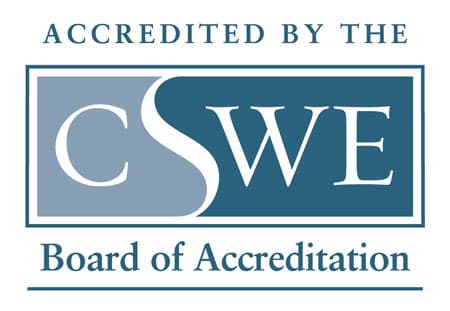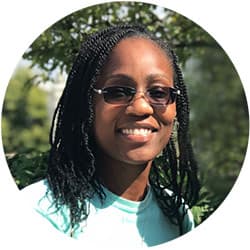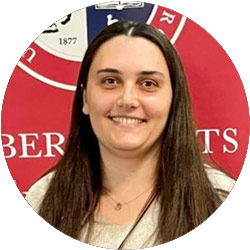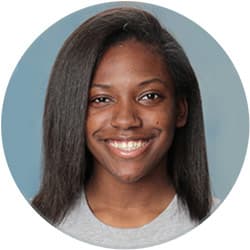Bachelor of Social Work (BSW)

Social Work Information Session
on Zoom
Learn more about Detroit Mercy's Bachelor of Social Work program and the FAST option by attending a virtual information session.
Registration is required.
Monday, April 8, 2024, 5-6:30 p.m. ESTFAST Option for Community College Students
Earning Your Bachelor of Social Work Takes Less Time Than You Think
Community college transfer students can be part of a Full-time Accelerated Social Work Transfer (FAST) option within Detroit Mercy's Bachelor of Social Work (BSW) program. In approximately three consecutive semesters (one year), qualifying transfer students take seven-week course modules that are scheduled conveniently on-campus with hybrid and asynchronous and synchronous online class sessions.
This module format makes it possible to complete the BSW program much faster than traditional BSW programs. Based on agency availability, students also have the option to explore work-site field placements and explore limited virtual (online) field education experiences. Students who do not meet the FAST eligibility requirements or who wish a traditional academic experience are invited to apply to Detroit Mercy’s BSW program and take the scheduling option at the standard semester pace.
Community college transfer students interested in becoming part of Detroit Mercy’s FAST option must have:
- Completed the Michigan Transfer Agreement (MTA)
- Completed 63 or more transferable credit hours
- Obtained a 2.50 or better grade point average
- Completed English 1310 (Academic Writing) or equivalent with a grade or better
- Communicated a commitment to engage successfully in an accelerated, demanding, and rigorous academic program
Learn more:
- View the Community College Transfer Student FAST Cohort Modules
- Download and Share the FAST Program Flyer (PDF)
700,000+
Professional social workers
employed in the United States,
and more than three million worldwide.
According to the U.S. Bureau of Labor Statistics, jobs in social work continue to be growing faster than average in the United States. Healthcare social workers will continue to be needed to help aging populations and their families adjust to new treatments, medications, and lifestyles.
![]()
Choose Your Path
Employment is expected to grow for social workers involved in child and family services, health care, mental health and substance abuse. In addition to assessing the needs of a population, social workers often influence the direction of organizations, administering programs while helping communities connect to resources.
![]()
Career Pathways
- Advocacy and Intervention counselor
- Behavioral Management coach
- Child and Family Social Worker
- Cyber (technology assisted) Social Worker
- Family Eligibility and Support Services advocate
- Forensic (Court) Services case worker
- Police Social Worker
- Wellness Education and Outreach worker
![]()
FAST Option
Community college transfer students have the option to complete their Bachelor of Social Work (BSW) curriculum faster than in traditional BSW programs. In approximately one year, students will complete block field placements, with limited online experiences. Other students currently employed in human service settings may qualify for work-site placements.
Join the New Wave of Social Work. Start Here!
Accreditation of a baccalaureate or master’s social work program by the Council on Social Work Education’s Board of Accreditation indicates that it meets or exceeds criteria for the assessment of program quality evaluated through a peer review process. An accredited program has sufficient resources to meet its mission and goals and the Board of Accreditation has verified that it demonstrates compliance with all sections of the Educational Policy and Accreditation Standards.
Accreditation applies to all program sites and program delivery methods of an accredited program. Accreditation provides reasonable assurance about the quality of the program and the competence of students graduating from the program.
Do you want to make a positive impact in the world?
University of Detroit Mercy's Bachelor of Social Work program prepares you for understanding the role of human diversity in a complex, multicultural world as you develop in the skills of leadership in service and in the promotion of social justice. By the end of the program, you will have gained a strong foundation in understanding human behavior and the social environment, social welfare policy and services, research methods and social work practice methods and skills.
In addition to a solid foundation, you will also complete 400 hours of hands-on experience at a human service agency where you will be supervised by a qualified social worker. The program prepares you for entry-level generalist social work practice, rooted in values and ethics, and instills a commitment to knowledge development and to continuous professional life-long learning.
Transferring from a community college?
Did you know students can transfer up to 63 credits earned at a community college? As a community college transfer student, you are already on your way toward earning a Bachelor of Social Work degree at Detroit Mercy. With Detroit Mercy's FAST option, community college transfer students have the option to complete their Bachelor of Social Work (BSW) curriculum faster than in traditional BSW programs.
Register for virtual information sessions just for transfer students
Each session is live and interactive using Zoom. You will learn about the BSW program, how to transfer credits, types of financial aid and scholarships and more! You will also be able to ask questions directly to the Chair of the Department of Social Work and a representative from the Office of Admissions.
For questions about the program or the information session, contact joinerjm@udmercy.edu.
Shakesha K. Alexander '19 speaks of her success
Shakesha K. Alexander '19, Director of Animal-Assisted Interventions at River Rouge School District, Mich, values the importance of human relationships and the human-animal connection. Responsible for pioneering the Pup Culture Lab at River Rouge High School, Alexander serves as the first female African American Veterinary Social Worker to work in a School District. She uses the trauma-informed approach to help students overcome adversity and create habits to be successful in life through positive interactions with therapy animals. Her kindness, forward-thinking and compassion is something that needs to be duplicated in every district.
Student success
Veterinary Social Work
Shakesha K. Alexander '19
Veterinary Social Worker, River Rouge School District
Shakesha Alexander is a 2019 graduate of the Detroit Mercy BSW degree program. Alexander earned a Master of Science in Social Work and a certification in Veterinary Social Work, an evolving area of social work practice, from the University of Tennessee. River Rouge School District (MI) issued a press release about Alexander, indicating, "We have spent the past several years working on the development of animal-assisted interventions and that work led us to the development of therapy dog teams to help our students cope with increased stress levels, anxiety, depression, and other issues that have only been heightened because of the COVID crisis. ...Mrs. Alexander brings a wealth of experience and compassion to this role."
Alexander's future goals include attaining a doctoral degree, while continuing to advance Veterinary Social Work as a clinical treatment modality with school-age children.
Student Leadership
Anisa Cekrezi
Detroit Mercy NASW-MI BSW Student of the Year 2023
Cekrezi was selected as the NASW-MI Student Social Worker of the Year from the department of social work for 2023-24.
"The purpose of my life is to offer happiness and service to others. As an immigrant from Albania, I am determined to fulfill my obligations toward American society because I found a second home in this country. I believe I can make a positive change in society, and I am determined to give back to American communities. I believe this country deserves love and service, so my mission is to become a school social worker. I want to assist, guide, lead, and support children in school settings, because I believe together, we are stronger." —Anisa Cekrezi
Sports Social Work
Moné Knowles
Social Work Major and Student Athlete
Moné Knowles is a senior student-athlete with the university’s track and field team. Knowles indicated that she chose to major in social work because she wanted to help a variety of people, and enjoys working with children. She currently helps coach a middle school volleyball team and finds volunteering her time rewarding because she is able to make a positive impact with children. After graduation, Knowles plans to secure employment in child welfare; working with foster care and child protective services to improve the lives of children. She believes working in child welfare will allow her to be a voice for children who are voiceless.
Knowles indicated that being a college athlete and social work major are similar, both roles take hard work and dedication. She loves being a student-athlete, and had this to say about the atmosphere before a competition: “I can tell you with certainty the bond you create with your teammates are bonds you will cherish forever.” Knowles went on to say that while in retrospect she had no idea what she was getting herself into as a college-athlete, she worked very hard setting goals every season. Establishing regular goals like measuring her personal best performance helped her achieve success on the track and in the college classroom.
Accreditation
-
Accreditation Status
The Detroit Mercy Bachelor of Social Work program is accredited by the Council on Social Work Education’s Board of Accreditation. The program's accreditation date is from 1980 through June 2026.
CSWE is a nonprofit national association representing more than 2,500 individual members, as well as graduate and undergraduate programs of professional social work education. Founded in 1952, this partnership of educational and professional institutions, social welfare agencies, and private citizens is recognized by the Council for Higher Education Accreditation as the sole accrediting agency for social work education in this country.
-
Mission, Goals & Competencies
Mission statement
The mission of the University of Detroit Mercy Social Work program is to provide academic experience and curriculum that enables students to integrate and apply knowledge, values and skills of the social work profession in order to become competent baccalaureate generalist social workers who engage in ethical practice, provide leadership in service, work with diverse client systems in a variety of settings and are committed to social and economic justice. The social work program's mission statement is an extension of the University's mission statement and provides the framework for program goals.
Program goals
The Social Work Program prepares students with a strong foundation in human behavior and the social environment, social welfare policy and services, research methods and social work practice methods and skills. The program's goals are to:
- To prepare BSW students for ethical, competent entry level, generalist professional social work practice, particularly in urban settings with diverse, poor, vulnerable and oppressed individuals, families, groups, organizations, and communities.
- To foster a commitment to continuing education, maintaining competence in practice, and enhancing and increasing opportunities for BSW graduates for renewal and advancement within the profession.
The Social Work Program does not grant experiential or previous work experience as a substitute for social work course credit.
Social Work Competencies
- Demonstrate ethical and professional behavior.
- Engage diversity and difference in practice.
- Advance human rights and social economic and environmental justice.
- Engage in practice informed research and research informed practice.
- Engage in policy practice.
- Engage with individuals, families, groups, organizations and communities.
- Assess individuals, families, groups, organizations and communities.
- Intervene with individuals, families, groups, organizations and communities.
- Evaluate practice with individuals, families, groups, organizations and communities.
-
Assessment of Student Learning Outcomes
-
Generalist Social Work Practice
Definition of generalist social work practice
Entry level to the profession of social work is considered to be generalist practice. Generalist social work practitioners work with individuals, families, groups, communities and organizations in a variety of social work and host settings. The generalist practitioner views clients and client systems from a strengths perspective in order to recognize, support and build upon the capabilities of all human beings. They use a professional problem-solving process to engage, assess, broker services, advocate, counsel, educate, and organize with and on behalf of client and client systems. In addition, generalist practitioners engage in community and organizational development. Finally, generalist practitioners evaluate service outcomes in order to continually improve the provision and quality of services most appropriate to client needs. (Adapted from BPD-2006)
-
Statement on Non-Discrimination
The Social Work Program is committed to providing an inclusive and welcoming environment that recognizes the inherent worth and dignity of all people. We are committed to foster tolerance, sensitivity and understanding, and mutual respect among our members and to offer a diverse educational experience that ensures only relevant factors are considered when determining admission, retention and performance. It is the program's policy not to discriminate on the basis of race, color, gender, national origin, age, religion, creed, disability, political belief, sexual orientation, gender expression, veteran's status, marital or parental status.
Meet our Social Work Advisory Board
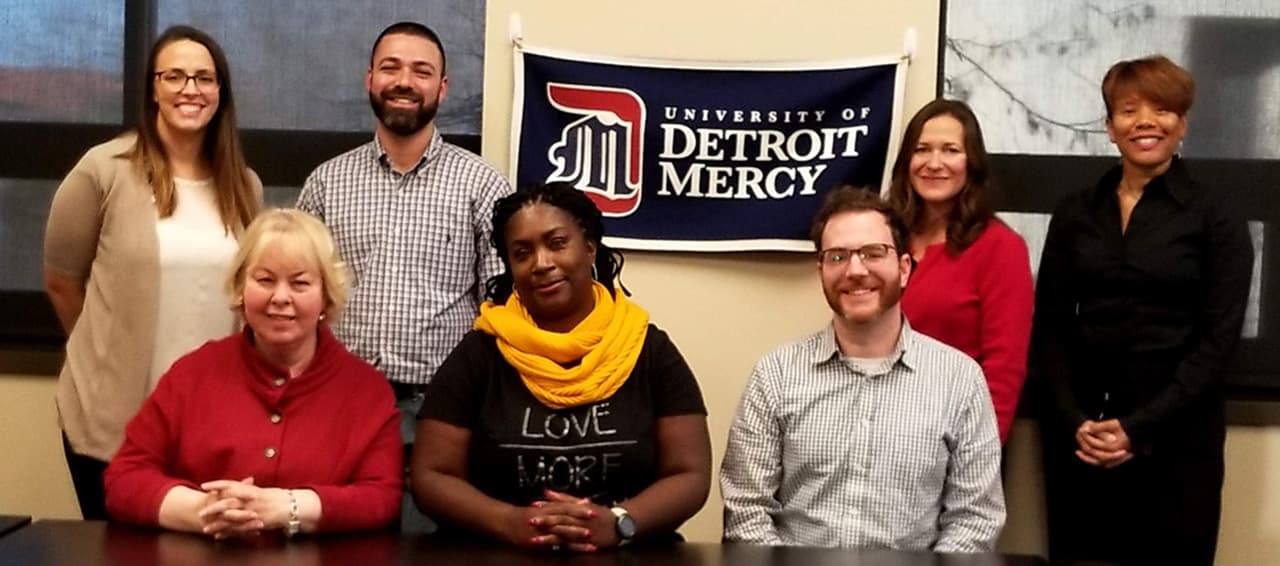
University of Detroit Mercy Social Work Advisory Board members, from left front: Aloha VanCamp, associate professor, University of Detroit Mercy; Wendy Hooker, CEO, Care Matters;Mead Goedert '06, private practitioner/clinician; Betsey Rheume, associate director, University of Detroit Mercy Admissions Department; Hassan Hammoud, United Way for Southeast Michigan; Juliana Harper, senior vice president & chief program officer, Easterseals Michigan; and Janet M. Joiner, assistant professor, Department of Social Work chair and advisory board chair, University of Detroit Mercy.
Not pictured: Belinda Evans Ebio, social work instructor, University of Detroit Mercy; Karon Smith, CEO, Advanced Educational Staffing (Old Redford Academy Schools) ; Carlynn Nichols, chief clinical officer, The Children's Center; Andrea Foley, director of behavioral health, Catholic Charities of Southeast Michigan.
Faculty
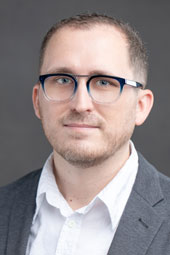
Nickolas Davis
Assistant Professor of Social Work
313-993-1561
davisnb@udmercy.edu
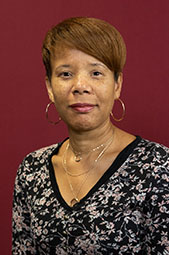
Janet Joiner
Assistant Professor of Social Work
*
Department Chair
313-993-1038
joinerjm@udmercy.edu
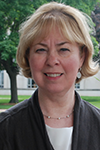
Aloha VanCamp
Associate Professor of Social Work
313-993-2010
vancampa@udmercy.edu

